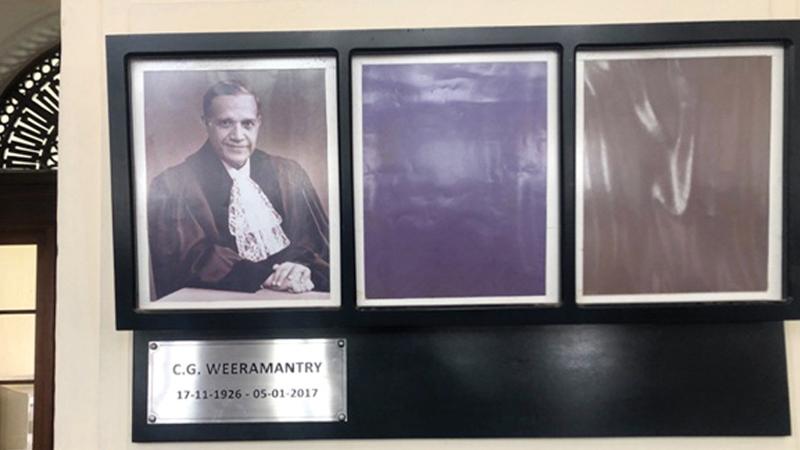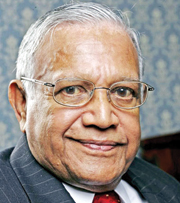
The Royal College Union recently unveiled the portrait of the eminent Sri Lankan jurist C.G Weeramantry at the Royal College main hall where the students of the college rally around until their school journey ends. The dozens of portraits adorning the walls of the college represent many faces from the colonial mudaliars to the Heads of the States. It is a stark reflection of the ethos that Royal perpetuated from its inception.
One can argue that those distinguished men bearing the portraits are the sheer memories containing the good, bad and ugly of the colonial era, in which Royal College played a cardinal role in upholding Macaulay’s mantra. The recently unveiled portrait of C.G Weeramantry at Royal College hall refutes such a claim as the persona of the late judge was antithetical to the colonial values and the decorated life he led was an embodiment of humanism, which uplifted the name of his country in the highest places he served around the globe.
 C.G Weeramantry
|
C.G. Weeramantry was born in 1926 in British Ceylon in an era Ceylon’s name was a synonym for a perfect model colony of the British Raj. Young Weeramantry was educated at Royal College Colombo, where he excelled in classics and carried many of the prizes at the college prize giving including the coveted Turnor prize for Latin poetry.
The intellectual upbringing at Royal during the two Great Wars impacted shaping the early thoughts of young Weeramantry, which resulted in transforming him into a broader personality in his career as a jurist and judge. It can be said that stern discipline and humanism inculcated by Principal Bradby moulded many young Royalists in the advent of the Second World War.
E.L. Bradby was the last Englishman who led Royal and whose attitude to education was a stark contrast to his predecessors as he displayed a sincere commitment to generating native values among the students. In his autobiography, judge Weeramantry recalls how Bradby recited the verses from the great scriptures of all the major religions in the world in the morning assembly that tended to create a universalistic harmony among the boys. Perhaps, it was at Royal, that C.G Weeramantry learned his first lessons of the values of great religions which resonated in all the major works of his life as a judge, an academic and a writer.
Heavyweight contribution
The biggest justification for glorifying the memory of the Judge Weeramanry even six years after his departure lies in his heavyweight contribution to international law, in which he rose to eminence as the Vice President of the International Court of Justice between 2000 and 2002. In a field filled with power politics and the domination of the West, Justice Weeramantry had the audacity to raise his dissent with no trepidation.
In examining the jurisprudence adopted by Judge Weeramantry during his days at the International Court of Justice as a judge and his vice president, one needs to comprehend the time he grappled with his legal reasoning. The year Judge Weeramantry entered the World Court in Hague in 1991 marked the end of the USSR, which saw the symbolic end of the cold war giving its reward to the USA for becoming the unchallenged omnipotent political giant in the global system.
However, the world that emerged after the Cold War began to see a new set of challenges relating to humanity. Moreover, the internal political chaos in post-colonial states in Africa, Latin America and Asia crumbled off its citizens while it raised a question of the aftermath of colonialism. This was the general geo-political atmosphere of the time Judge Weeramantry began his career at ICJ. This unstable situation and the power unbalanced loomed after the cold war paved an apt path for justice Weeramantry for activism in ICJ.
He was not taken aback by the textualists around him at ICJ to shape his opinions, which were inspired by many communitarians and religious values beyond black letter law. As an example, his vehement opposition to the legality of nuclear weapons was strengthened by some deep insights taken from the world of major religions.
Weeramantry has taken various instances of religious scriptures to prove his position beyond international law, which shows how ancients followed the rules of war without annihilating the whole enemy. Weeramantry took the ancient Indian epic Ramayana to prove how its hero Prince Rama impeded his army from launching a destructive weapon that could uproot not only his enemy King Ravana, but his whole country too. In Rama’s justification to oppose launching such an attack, Rama states, “Because such destruction of the masses was forbidden by the ancient laws of war, even though Ravana was fighting an unjust war with an unrighteous objective.
Deep reading
His ideas on global trust and peace were mainly attributed to his deep reading of the world’s major religions and cultures. In his separate opinion in Hungary vs. Slovakia, Judge Weeramantry unveiled a bit of history of the vast hydraulic civilisation that existed in ancient Sri Lanka as a pragmatic example of how sustainable development and the principle of trust have bloomed in the past.
The sermon preached by Arahant Mihindu to King Devanampiya Tissa (around 237 B.C) on Buddhist understanding of governance was quoted by Judge Weeramantry in his separate opinion of Hungary vs Slovakia as an illustration of sustainable development and trustworthiness.
His knack for highlighting the universal values of religions above the positivistic jurisprudence may have gained its seeds from his halcyon days at Royal as he vividly recalls in his autobiography. Nonetheless, his colossal image as a jurist took up the name of Sri Lanka and its ancient civilisational legacies globally.
Besides his august career as a jurist and a judge of the highest court in the world, C.G Weeramantry was an affable person who remained approachable to law students in his post-retirement chapter in Sri Lanka. Thus, the decision by the Royal College Union to unveil the portrait of Justice Weeramantry in the college hall was the right one for this upright person.
